|
Selected
Translations of Vaclav Havel
by Paul Wilson
Click
on a title below to view covers, summaries and full bibliographical
information:
The
Beggar's Opera, Vaclav Havel. Cornell University
Press, Ithaca. (2001)
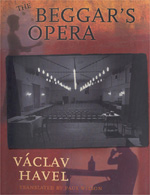 The
Beggar's Opera is a free-wheeling, highly politicized
adaptation of John Gay's well-known eighteenth century work
of the same name. The play, reminiscent of Havel's earlier
Garden Party and The Memorandum, is up to his best satirical
standard. Like the Brecht/Weill Threepenny Opera, Havel's
play uses an underworld milieu to explore the intermingled
themes of love, loyalty, and treachery. The
Beggar's Opera is a free-wheeling, highly politicized
adaptation of John Gay's well-known eighteenth century work
of the same name. The play, reminiscent of Havel's earlier
Garden Party and The Memorandum, is up to his best satirical
standard. Like the Brecht/Weill Threepenny Opera, Havel's
play uses an underworld milieu to explore the intermingled
themes of love, loyalty, and treachery.
The
Beggar's Opera
at Amazon.com
The
Art of the Impossible - Politics as Morality in Practice,
Vaclav Havel. Knopf. New York. (1997)
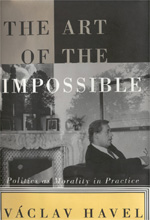 There
is no shortage of politicians who make a habit of shooting
from the hip, but it is much rarer to find one who speaks
from the heart. Vaclav Havel knows no other way to speak,
or to write. Both as a dissident and as a playwright it was
his sworn purpose for many years to combat evil with nothing
but truth. As president of Czechoslovakia, and now the Czech
Republic, he has clung to that habit, refusing to turn over
either his conscience or his voice to political handlers and
professional speechwriters. Instead he assumes the additional
burden- for him, it is a distinct pleasure - of composing
all of his oratory. Audiences from New York to New Delhi,
Oslo to Tokyo, have been the luckier for his decision. There
is no shortage of politicians who make a habit of shooting
from the hip, but it is much rarer to find one who speaks
from the heart. Vaclav Havel knows no other way to speak,
or to write. Both as a dissident and as a playwright it was
his sworn purpose for many years to combat evil with nothing
but truth. As president of Czechoslovakia, and now the Czech
Republic, he has clung to that habit, refusing to turn over
either his conscience or his voice to political handlers and
professional speechwriters. Instead he assumes the additional
burden- for him, it is a distinct pleasure - of composing
all of his oratory. Audiences from New York to New Delhi,
Oslo to Tokyo, have been the luckier for his decision.
This
volume consists of thirty-five of these essays, written between
the years 1990 and 1996, that manage to be both profoundly
personal and profoundly political. Havel writes of totalitarianism,
its miseries and the nonetheless difficult emergence from
it. He describes how his country and the other post-communist
countries are learning democracy from scratch and are encountering
obstacles from inside and out. He marvels at the single technology
driven civilization that envelops the globe, and the challenges
this presents to multicultural realities. He invokes the duty
of every person alive to prevent hatred and fear from derailing
history ever again. He acknowledges "the advantage it
is for doing a good job as president to know that I do not
belong in the position and that I can at any moment, and justifiably,
be removed from it." And he reminds us that - contrary
to all appearances - common sense, moderation, responsibility,
good taste, feeling, instinct, and conscience are not alien
to politics, but are the very key to its long-term success.
The
Art of the Impossible: Politics As Morality
in Practice at Amazon.com
RETURN
TO TOP
Security Guards Vancouver
Toward
a Civil Society: Selected Speeches and Writings, Vaclav
Havel. Nakladatestvi Lidove Noviny. Prague. (1994)
Vaclav
Havel was born in Prague on October 5, 1936. Because of his
"bourgeois" background, his education options were
limited. Havel studied at the Economics Faculty of the Czech
Technical University from 1955 to 1957, and after compulsory
military service began working in theater. He joined Prague's
Theater on the Balustrade in 1960, where his plays enjoyed
their first international success.
From
1962 to 1966, Havel studied dramaturgy at the Academy of Performing
Arts in Prague. He was active in the Prague Spring era of
reforms, which ended with the Warsaw Pact invasion in August
1968. Havel actively opposed the invasion and the resulting
hard-line communist policies, and in 1969 his work was banned
in Czechoslovakia. In 1977, Havel became a cofounder of the
Charter 77 human rights initiative. He was under house arrest
in 1978-79 and was incarcerated several times for his beliefs.
In
November 1989 Havel became one of the leaders of Civic Forum,
the opposition movement that helped bring about the end of
Communist rule. On December 29, 1989, he was elected president
of Czechoslovakia. The new, freely elected Parliament reelected
him on July 5, 1990. Havel resigned on July 20, 1992, as the
country headed for dissolution. On January 26, 1993, Havel
was elected the first president of the Czech Republic.
RETURN
TO TOP
Summer
Meditations, Vaclav Havel. Knopf Canada; Knopf USA; Faber
& Faber London. ( 1991)
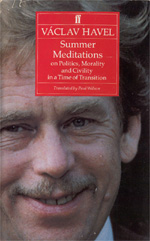 In
his first book as president of the Czech and Slovak Federal
Republic, Vaclav Havel offers us a profound meditation on
the nature and practice of politics and a stirring plea for
morality, civility, and openness to public life in a time
of overwhelming global change. In
his first book as president of the Czech and Slovak Federal
Republic, Vaclav Havel offers us a profound meditation on
the nature and practice of politics and a stirring plea for
morality, civility, and openness to public life in a time
of overwhelming global change.
From
his unique perspective as both the head of a state and a writer
of great clarity and eloquence, Havel reflects on his experience
in office, and on the questions that his own presence there
brings so powerfully to mind: Is there a place for morality
and for simple decency, in politics? Have his ideals and principles
- forged through two decades of courageous opposition to totalitarianism
- a place in public life?
His
answer, put forth with remarkable candor, is unequivocally
affirmative. He explores in this forthright book the practical
problems facing his country today and openly examines the
traumas of economic transition that have become central not
only in Czechoslovakia but throughout the former Communist
bloc. He grapples with the details of political change, and
with the complex emotional issues of nationalism, separatism,
and environmental devastation. He argues for a dynamic new
market economy tempered by compassion, and for the central
role of art and culture in transforming society. Writing with
passion and energy, Havel reveals his dreams and his vision
for a civil society of the future, stressing the essential
goodwill in people, the responsibilities of those who lead
them, and the need for tolerance. In the great seriousness
of his commitment he demonstrates a moral and political consistency
all too rare in public life.
Summer
Meditations is a timely and necessary book. Illuminated
by Vaclav Havel's sincerity and directness, by his common
sense and by his uncommon moral courage, it gives us an essential
understanding of the problems and the promise in the post-Communist
world.
Summer
Meditations at Amazon.com
RETURN
TO TOP
Open
Letters: Selected Writing 1963-1989, Vaclav Havel. Selected,
translated and edited with an introduction by Paul Wilson.
Knopf USA; Faber & Faber, London. (1991)
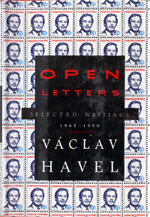 Nearly
everything Vaclav Havel has ever written has acquired a new
resonance since he became President of Czechoslovakia in 1989.
Here, brought together for the first time in authorized translations,
are his most important writings--spanning twenty-five years
of political activism--from the early sixties when he was
a relatively unknown dissident playwright to the remarkable
New Year's Address, his first as president ("...I assume
you did not propose me for this office so that I, too, would
lie to you"). Nearly
everything Vaclav Havel has ever written has acquired a new
resonance since he became President of Czechoslovakia in 1989.
Here, brought together for the first time in authorized translations,
are his most important writings--spanning twenty-five years
of political activism--from the early sixties when he was
a relatively unknown dissident playwright to the remarkable
New Year's Address, his first as president ("...I assume
you did not propose me for this office so that I, too, would
lie to you").
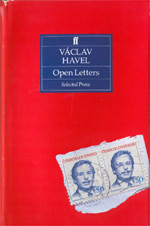 This
volume contains several previously untranslated pieces (including
a private letter written to Alexander Dubcek after the Soviet
invasion of Czechoslovakia, and unpublished prison letters),
the famous "Open Letter" to Dr. Husak, and Havel's
most powerfully argued and influential essays (such as "Politics
and Conscience" and "The Power of the Powerless")
all of them lucid, witty, and written with formidable conviction
and courage. There are also revealing interviews with Havel
and a number of his own often absurdist accounts of police
repression. This
volume contains several previously untranslated pieces (including
a private letter written to Alexander Dubcek after the Soviet
invasion of Czechoslovakia, and unpublished prison letters),
the famous "Open Letter" to Dr. Husak, and Havel's
most powerfully argued and influential essays (such as "Politics
and Conscience" and "The Power of the Powerless")
all of them lucid, witty, and written with formidable conviction
and courage. There are also revealing interviews with Havel
and a number of his own often absurdist accounts of police
repression.
Open
Letters stands as an essential addition to the literature
of dissent. These essays, written out of Havel's immediate
experience of the world, are at once a chronicle of recent
European history and direct agents of that history. They are
a vivid record of the development and moral philosophy of
a greatly admired and beloved European intellectual figure.
RETURN
TO TOP
Disturbing
the Peace, Vaclav Havel. Knopf USA; Faber & Faber,
London. (1990)
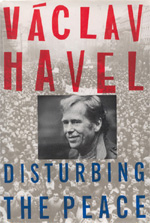 In
December 1989, the celebrated playwright and defender of human
rights Vaclav Havel was elected president of Czechoslovakia.
The poetic and historic justice of the even will powerfully
strike the reader of Havel's revelatory self-portrait, Disturbing
the Peace. In
December 1989, the celebrated playwright and defender of human
rights Vaclav Havel was elected president of Czechoslovakia.
The poetic and historic justice of the even will powerfully
strike the reader of Havel's revelatory self-portrait, Disturbing
the Peace.
This
memoir derives from months of long-distance conversation-conducted
by letter and tape recorder in 1986-with Karel Hvizdala, a
Czech journalist living in West Germany. Havel, who was then
approaching his fiftieth birthday, gives us a wonderfully
open and engaging account of himself. He looks back on his
Prague childhood-at once privileged and isolated-and contemplates
its effect on his life, both as a writer and as a rebel -
one of the truly dangerous ones" as Heinrich Boll called
him, "the gentle and courteous sort". He talks about
his life in the theatre, particularly the "theatre of
the absurd," where he feels art has most directly addressed
the spiritual predicament of modern man. He recalls the literary
and political battles of his early years, his involvement
in the Prague Spring of 1968, and the hopeless stagnation
that followed the Soviet invasion. He talks about his part
in the long struggle to bring moral and civic responsibility
back into his country's public life. Without bitterness, he
describes the constant surveillance to which he was subjected,
the harassment by police, the years in prison, and the banning,
for more than two decades, of his plays, essays, and books.
Throughout, Havel speaks with candor and wit, fully attuned
to the abundant ironies of his paradoxical life: a diffident,
introspective intellectual indicted for crimes of subversion
and "hooliganism"; a lover of order drawing meaning
from absurdity; a "mercilessly skeptical" playwright
whose life embodies the politics of hope.
Disturbing
the Peace is a meditation on the transcendent clarity
of art, on human identity and responsibility, on the necessity
of speaking the truth, and on the necessity of laughter. It
stands as an essential statement about Havel's life and work,
and about the power of an artist to awaken the national conscience-an
awakening that has had a profound effect on the course of
his country's history and on the imagination of the world.
RETURN
TO TOP
Letters
to Olga, Vaclav Havel. Selected, edited and translated
by Paul Wilson. Knopf USA; Faber & Faber, London. (1988)
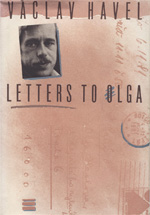 These
are the letters that Vaclav Havel wrote to his wife, Olga,
while he was in prison. Allowed to write once a week, only
to Olga and only on "family matters", Havel is determined
to make his slender connection to the world mean something.
As he talks about himself, his past, his moods, his failings,
about the theater and his own plays, he tries to express what
is most important to him in a style sometimes elliptical and
abstract, sometimes subversively mischievous, that will baffle
the prison censors. What evolves is an extraordinary discourse
(remarkable too, in that it did elude the censors) on the
nature of belief and the necessity of "being in the world,"
on the dangers facing the modern world from the seductions
of ideology and from our blind faith in technology and progress.
Again and again he contemplates the meaning of the sentence
he is serving and the problem of individual responsibility
in a world indifferent to human identity. From the isolation
of his prison cell, he remains unrepentantly outspoken, deeply
involved in the public life and the fate of his nation. These
are the letters that Vaclav Havel wrote to his wife, Olga,
while he was in prison. Allowed to write once a week, only
to Olga and only on "family matters", Havel is determined
to make his slender connection to the world mean something.
As he talks about himself, his past, his moods, his failings,
about the theater and his own plays, he tries to express what
is most important to him in a style sometimes elliptical and
abstract, sometimes subversively mischievous, that will baffle
the prison censors. What evolves is an extraordinary discourse
(remarkable too, in that it did elude the censors) on the
nature of belief and the necessity of "being in the world,"
on the dangers facing the modern world from the seductions
of ideology and from our blind faith in technology and progress.
Again and again he contemplates the meaning of the sentence
he is serving and the problem of individual responsibility
in a world indifferent to human identity. From the isolation
of his prison cell, he remains unrepentantly outspoken, deeply
involved in the public life and the fate of his nation.
These
letters are a work of self-preservation; they reveal a man
of formidable moral courage struggling not to succumb to the
tempting embrace of nihilistic despair, struggling to defend
his dignity and his identity under circumstances of humiliation
and deprivation. Prison becomes for him "a school of
great self control"; as it enlarges the circle of things
he can understand, it more clearly and narrowly defines the
circle of things he can respect. Difficult, demanding (in
his own words "politely intractable") Havel triumphs
over isolation and powerlessness through the clarity he achieves
in these letters, leaving us with a multi-layered work of
lasting value, a profound and moving meditation on our world.
Letters
to Olga: June 1979-September 1982 at
Amazon.com
RETURN
TO TOP
The
Power of the Powerless, Vaclav Havel. Hutchinson, London.
(1985) Sharpe, New York. (1986)
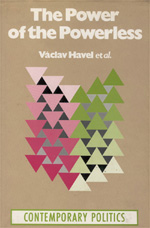 This
powerful collection of essays by Czechoslovak writers is now
published in the West for the first time. Written shortly
after the formation of Charter 77, and just prior to the birth
of solidarity, it is among the most original and compelling
pieces of political writing to have emerged from central and
eastern Europe during the whole post-war period. Vaclav Havel's
essay provides the title for the book. It was read by all
the contributors who in turn responded to the many questions
which Havel raises about the potential power of the powerless. This
powerful collection of essays by Czechoslovak writers is now
published in the West for the first time. Written shortly
after the formation of Charter 77, and just prior to the birth
of solidarity, it is among the most original and compelling
pieces of political writing to have emerged from central and
eastern Europe during the whole post-war period. Vaclav Havel's
essay provides the title for the book. It was read by all
the contributors who in turn responded to the many questions
which Havel raises about the potential power of the powerless.
The
essays explain the anti-democratic features and limits of
Soviet type totalitarian systems of power. They discuss such
concepts as ideology, democracy, civil liberty, law and the
state from a perspective which is radically different from
that of people living in liberal western democracies. The
authors also discuss the prospects for democratic change under
totalitarian conditions. Steven Lukes's introduction provides
an invaluable political and historical context for these writings.
The
authors represent a very broad spectrum of democratic opinion,
including liberal, conservative and socialist.
RETURN
TO TOP
|